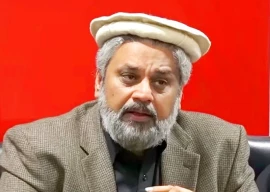So let’s talk about the perspiration. More specifically, the unsung scientists and students who work and slog in an effort to expand the boundaries of science and invention. These are the guys who actually build a better mousetrap, or figure out ways to make more fuel-efficient cars. It is their inventions that make your lives easier (or sometimes more dangerous) and it’s the fruits of their labour that drive global economies.
Now for the bad news: try Googling ‘Pakistani inventions’ and the first hits you’ll get are from Wikipedia. Click the link and you’ll find a mention of Dr Abdus Salam and another about a process developed by a Pakistani scientist called the Ommaya method. There’s also the ‘Brain’ computer virus which was developed by a couple of Lahore-based software whizzes. That’s pretty much it.
The question is: why? Why is there such a paucity of Pakistani inventions and innovations translating into actual, usable and commercially viable projects? It’s not as if we, as a people, are strangers to innovation. ‘Jugaar’ or improvisation is practically a national trait after all.
Dr Suleman Ashraf is the director of Satuma, a private company involved in the manufacture of UAVs which are used by the Pakistan Air Force. According to him, the lack of legal protection is one of the major hurdles facing scientific advancement in Pakistan today. “In the West it was realised very early on that due recognition should be given with legal protection to someone who invents or introduces new ideas. Thus the concept of patent was born,” he says. Ashraf admits that patent laws also exist in Pakistan but says that, due to a lack of trust in the legal system, people are still reluctant to share knowledge. This, in turn, leads to stagnation. “Globally speaking, where we stand now is due to the cumulative knowledge gathered over the millennium and passed on to the next generations.” Indeed, we have seen further only because we have stood on the shoulders of giants, but here every researcher has to start from scratch.
“We thus keep inventing the same thing over and over or keep making the same mistake over and over because no one will guide us,” says Ashraf.
TONS OF TALENT
If there’s one thing that everyone agrees on, it’s that there isn’t a shortage of talent. “In fact,” says Dr. Ashraf, “our young scientists are exceptionally brilliant. That can be seen by how well they do in foreign countries.”
The Associate Professor of Bahauddin Zakariya University’s Chemistry department, Najamul Haq, has seen batches of students come and go, and he reacts strongly to a suggestion that Pakistan’s youth lack skill. “Foreign professors are on the lookout for HEC Pakistani students due to their track records. In many cases I saw Pakistani students leading the whole research group in foreign universities,” he adds.
So where’s the problem? Well, according to Rauf, a large part of it is the way the educational system itself works. “Someone who has talent, passion and great scores in physics cannot secure a place in a good university if his scores in all other subjects are average,” he says. According to him, this keeps a lot of good students away from advancing in their requisite fields. Lack of funding and government interest also factor in. Najamul Haq is also disdainful of the way research is conducted, saying “Most of the research being conducted is in the very basic sciences, with very few people involved in practical applied research.”
But applied research would only receive a boost if there was an industrial sector capable and willing to consume the fruits of our students’ labours. And therein lies the Shakespearean rub.
THE MISSING LINK
The world over, student researchers have their work funded by multinational corporations, defence industries or the government. Scouts scour universities looking for usable projects which are then translated into lucrative products. Industry and academia work hand in hand. In Pakistan, this just doesn’t happen.
It’s not as if there aren’t usable ideas out here either. Take even a cursory look at the projects some of our young Einsteins work on and you’ll find touch screen computers, remote controlled robotic limbs and even unmanned ground vehicles that can be used for a variety of purposes.
Unfortunately, a great number of interesting projects from students that might have been funded have been overlooked. Rauf claims that many research projects with positive feasibility reports were done but sadly none of them were funded or used. Some of the ones that he saw uselessly tossed aside included projects on plants that can sustain high salinity, a project that could have been a boon for areas of the country affected by salinity. “We have failed to develop a consortium between the research facilities that develop technologies and the industries that use them,” he says. “But the most important reason [for scientific stagnation] is that Pakistan’s industries are reluctant to respond positively to research that is feasible and can be implemented.” This is why, says Rauf, Pakistani science and Pakistani industry seem to exist in two separate worlds.
Rauf explains that the few indigenous success stories that had been visible up till now — like the first antivirus made in Pakistan– were all personal efforts. Sadly, our industry is still unable to assimilate talent such as this.
Najam also believes that there is a lack of coordination between the academia and industry of Pakistan. “The real culprit is the psychology of Pakistani industrialists. They are perfectly happy to import and process raw materials, rather than engage scientists for product development. Some 80 per cent of the industry is not conducting active research, preferring to remain within the field of basic processing. It’s a vicious cycle.”
Ashraf agrees that there are some great universities that are doing some good research, but he concedes that their work is not being used, simply because industrialists are not research-oriented and do not fund research. The students, with their meagre resources, may demonstrate an idea but they cannot make it into a viable product without funding. Our industry, he says, simply does not want to take that risk.
In the recent past, says Rauf, efforts were being made by Dr Atta-ur-Rahman to make a consortium of industries and research faculties to develop and make need-based research. “But he had to surrender and quit his post, and the whole story is well covered by the media.” Rauf explains that, up to an extent, some industries did sponsor some research projects. “But these projects were not up to international standards.” Moreover, he says that sometimes, students cut down on their research in order to maintain their GPA’s and put more time in study than research.
Given the historical aspect of the situation, Ashraf strikes an optimistic note, saying that up till the late ‘80s there were very few good engineering universities in Pakistan, and most of those were in the public sector. “The professors of those institutions were discouraged from extra activities other than their teaching assignments, but now there are closer ties between academia and industry. The students now take mandatory internships in the industrial sector and are found to be good contributing assets.”
And in this sense, Suleman Ashraf does not believe that there is a divide within the academia and the industry. “I always give internships to students in my company and find no problem with this aspect of the industry-academia relationship. Some of the universities are very organised in finding placement for their students. They have coordinators who start contacting different Industrial setups ahead of time to find their needs and offering them interns.”
So yes, the science scenario is bleak at the moment, along with so much else. But baby steps are being taken to try and bridge the gap between academia and industry. Recently, both NUST and NED have held conferences and workshops aimed at bringing researchers together with the captains of industry.
Hopefully, this long sought after alchemy will help transform the lead of research into gold that may well swell Pakistan’s coffers. And hopefully it’ll happen in our lifetimes.
Eureka!
Hovercraft Developed by Pakistani Students
Mohammad Naeem Khan, Zaki Hussain and Mohammad Qasim, three intermediate students from the Sir Syed Science College in Rawalpindi, developed Pakistan’s first hovercraft in 2009. This is an amphibious vehicle that is supported by a cushion of slightly pressurised air; it floats on a cushion of air that has been forced under the craft by a fan which causes the craft to rise.
Solar Car by Pakistani Students — SSUET
In 2011, Farhan and Shafiq, two students from Sir Syed University of Engineering and Technology in Karachi, invented a solar-powered car. There are solar panels attached to the top of the car which store the sun’s energy. Along with solar energy, electricity can also be used to charge the car. The average speed of the car is 40-45 km/h. It gives a mileage of 60 km per charging which means that if the battery is fully charged one can easily travel 60 kilometers.. It is a cost-effective, environment-friendly system for transportation invented in 2011.
Gas Fan Invention by Waheed Babar
Waheed Babar, a resident of Lahore, invented a “Gas fan” which is powered by domestic gas and/or LPG. He has been attempting to make these fans for the past 25 years and eventually succeeded in 2009. However, due to lack of funds he has been unsuccessful in producing it in bulk. The fan can run up to 400 hours on one kilo of fuel. This fan, as per domestic gas, costs just one rupee for four hours and one rupee for every two hours on LPG.
Hybrid Car by Students of NUST University
A group of 11 students from National University of Science and Technology (NUST) made Pakistan’s first-ever hybrid car, named DAVRIM II, in 2010. The vehicle combines a combustion engine with an electric motor to increase its efficiency; it also harvests energy lost during breaking and reuses it for running. It uses super capacitor banks to store energy; the petrol engine produces a constant energy of 3.5 British horsepower and the remaining power comes from the super capacitor banks.The group came up with the idea at a birthday party back in July 2009.
UGV (AYAAN ROVER)
The Ayaan Rover is a rock climbing robot which was developed by Waqar Hussain, Syed Fawad Ali, Muhammad Furqan, Aqeel Ahmad, Ahasn Siddiqui and Muhammad Shaheer in 2010.
The use of Unmanned Ground Vehicles (UGVs), in both Military and Civilian markets, has skyrocketed since the last two decades. On the battlefield, commanders have unprecedented capability to perform Intelligence, Surveillance, and Reconnaissance (ISR) missions.
Recycled Plastic Bottle Solar Water Heater
Abdul Rauf made a solar water heater from recycled water bottles with the help of his friends Saad, Hassan and Tipu, in 2010. It heats water up to 90°C and also serves as a makeshift desalination plant. The idea behind it was to allow people in the northern areas to heat water using this mechanism rather than burning firewood.
Brain controlled Robotic Arm
A group of Pakistani students from NUST University invented a Brain Controlled Artificial Robotic Hand named MYO-Electric Prosthetic Upper Limb. It has been specially designed for handicapped people, by connecting some sensors to the arm. The robotic arm detects the brain’s signals and responds accordingly.
Unique Energy Producing machine
Syed Adnan Subzwari, a young scientist from Karachi, completed the theoretical concept of a unique engine, capable of producing huge amounts of energy, which can run electric generators and machineries without using any fuel. The idea behind it was to provide a solution-based technique to resolve the energy crisis in Pakistan.
Brain computer Virus
One of the first ever computer viruses was invented in Lahore. Brain was the brainchild (no pun intended) of two brothers named Basit and Amjad Farooq Alvi in 1986. It affects the IBM PC computer by replacing the boot sector of a floppy disk with a copy of the virus. The real boot sector is moved to another sector and marked as bad.
The brothers told TIME magazine that they had written it to protect their medical software from piracy and it was supposed to target copyright infringers only.
Pakistan’s First Anti-Virus “Instant Virus Killer”
Two Pakistanis Hafiz Usman and Imran claim to have made the only anti-virus in the world which can fix the Microsoft windows re-boot issue once viruses infect system files.
They claim that if the precautions for Windows safety are carefully followed, the anti-virus can give 90% protection against viruses entering the computer via the web, USB disks and pirated CDs.
BRIDGING THE GAP
In 2009, a group of young scientists and scholars decided to set up an organisation called the National Academy of Young Scientists (NAYS) aimed at bridging the gap between academia and industry and facilitating sharing of information between various scientific disciplines. NAYS is also attempting to link Pakistani researchers with foreign researchers in order to facilitate scientific research.
NAYS is working to create a network of coordinators in various universities who can help students get access to the latest research work, scholarship information, admissions, conferences, workshops and jobs etc.
With a current membership of 1800, NAYS is hopeful that they can play a role in lifting Pakistani science from the current morass.
VOX POPULI
According to a GALLUP PAKISTAN survey, 38% per cent of Pakistanis polled consider scientific excellence to be the single most important factor contributing to the power of a country. The economy (37%) came in a close second, while military strength was considered the most important factor by only 24% of the respondents.
Published in The Express Tribune, Sunday Magazine, August 28th, 2011.
Correction: The quote at the beginning of the article had earlier been misattributed to Albert Einstein. The correction has been made.
COMMENTS (11)
Comments are moderated and generally will be posted if they are on-topic and not abusive.
For more information, please see our Comments FAQ

1729234806-0/Robert-Pattinson-(2)1729234806-0-165x106.webp)

1732151670-0/Untitled-design-(41)1732151670-0-165x106.webp)













And who messed up the HEC?
Comment already posted.
The article is a timely update of the articulated assessment regards Pakistan's Talent pool and it's actually utilized fraction, however small it may appear. The recommendations are strongly supported. The activities and proposals/projects of the Young Sceintists need to be to be shared with industry and financing entities in more articulate manner and as robustly as we witnessed when Dr Atta ur Rahman was in the lead. I propose we creat a committed catalystic and coordinating body ( structured NGO) with the purpose to accelerate the process of bringing sceintists ( all, whether young, experienced or well recognised) and facilitating financing where a project is too large for a private business to support. I offer my services as early stage coordinator. but at more articulate level, scientists will have to take full charge.
Apart from the achievements mentioned in the post, Nearly every year National Engineering and Robotics Contest takes place and there are teams from 25 to 30 universities who participate in this tournament. The event is like a football match of robots on a slightly limited scale. There are also robot wars.
In my opinion each year these kind of events should take place with a SUBJECT. Like we can have a defense mechanism drones, or probably robots that can help in agriculture so that the focus of mechanizing diversifies.
Industry giants are particularly interested in student projects that address common problems of the country they are operating in. With proper exposure through these kind of opportunities, i guess we can do much better.
This is the core issue. If a country needs to develop, industries should play its role more pro-actively. In fact this is the only factor which almost all developed countries have adopted.
From A research engineer in a multinational gaint
Excellent article by Omair Zeeshan but it will be great if it also had introduction of Pakistan Science Club,
@adeel:
You are correct, the error is ours. Thanks for pointing it out,
nice article but in the beggining its edison not einstein who said that that "genius is 99% prespiration and 1% inspiration"
The problem in Pakistan is favoritism and family ties, The success of a man without contacts is very difficult and more so for those people in science since pr is the most difficult part of their job . The more social tend to succeed yet the more creative one are gushed down or leave the country. Most Professors at all Universities have their favorites and success and guidance is only limited to those few .
Excellent topic to write on.To make awareness is also a major contribution.
As to why Pakistan inventions does not have much in Google,etc etc. The answer is that there is much more being done by Pakistani minds (locally and internationally) but due to lack of proper information structure ( like in many other areas) not much comes out.
All what is needed is proper management and thereby channelizing of information from various resources into one consolidated source....in the present world not at all difficult with internet,email,etc etc technologies on hand... all what is needed is the conviction and the thought to do it.
Although it should be done by a government concern but due to reasons moreover known probably an initiative from a private company or a university would achieve the much required recognition of the unsung hero's.............